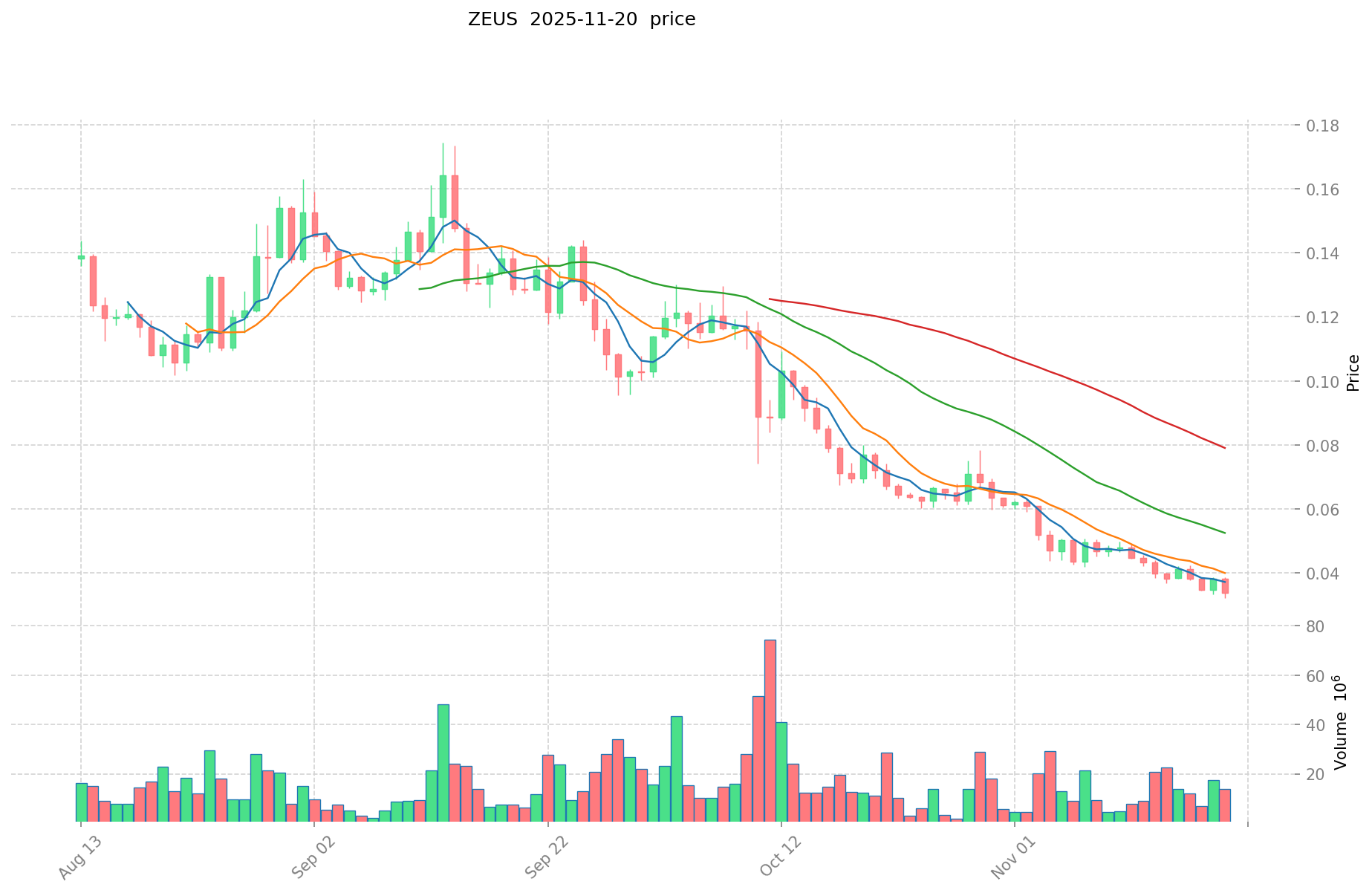What is ZEUS: The King of Greek Gods and His Legendary Powers
Zeus Network's Position and Significance
In 2024, Zeus Network (ZEUS) was launched as a cross-chain communication layer implemented on SVM. Its primary mission is to introduce Bitcoin liquidity to Solana through its first DApp, APOLLO.
As of 2025, Zeus Network has become an important player in the cross-chain communication and liquidity provision sector, with a market cap of $14,148,195 and 81,546 holders. This article will analyze its technical architecture, market performance, and future potential.
Origin and Development History
Background of Creation
Zeus Network was created in 2024 to address the challenge of bridging Bitcoin liquidity to the Solana ecosystem. It emerged during a period of growing interest in cross-chain interoperability and the expansion of DeFi capabilities across different blockchain networks.
Zeus Network's launch brought new possibilities for enhancing liquidity and cross-chain functionality between Bitcoin and Solana.
Important Milestones
- 2024: Mainnet launch, implementing cross-chain communication on SVM.
- 2024: Introduction of APOLLO, the first DApp aimed at bringing Bitcoin liquidity to Solana.
Zeus Network continues to optimize its technology, security, and real-world applications with the support of its community and development team.
How Does Zeus Network Work?
Decentralized Control
Zeus Network operates on a decentralized network of computers (nodes) spread across the globe, free from control by any single entity. These nodes collaborate to validate transactions, ensuring system transparency and attack resistance, thus providing users with greater autonomy and enhancing network resilience.
Blockchain Core
Zeus Network's blockchain is a public, immutable digital ledger that records every transaction. Transactions are grouped into blocks and linked through cryptographic hashes, forming a secure chain. Anyone can view the records, establishing trust without intermediaries.
Ensuring Fairness
Zeus Network utilizes the Solana blockchain's Proof-of-Stake (PoS) consensus mechanism to validate transactions and prevent fraudulent activities such as double-spending. Validators maintain network security by staking SOL tokens and running nodes, receiving rewards for their participation.
Secure Transactions
Zeus Network employs public-private key cryptography to secure transactions:
- Private keys (like secret passwords) are used to sign transactions
- Public keys (like account numbers) are used to verify ownership
This mechanism ensures fund security while maintaining transaction pseudonymity.
ZEUS's Market Performance
Circulation Overview
As of November 20, 2025, ZEUS has a circulating supply of 401,823,212.72706 tokens, with a total supply of 999,996,056.211855.
Price Fluctuations
ZEUS reached its all-time high of $1.1485 on April 8, 2024.
Its lowest price was $0.03206, recorded on November 19, 2025.
These fluctuations reflect market sentiment, adoption trends, and external factors.
Click to view the current ZEUS market price

On-Chain Metrics
- Daily Transaction Volume: $542,875.61 (indicating network activity)
- Active Addresses: 81,546 (reflecting user engagement)
ZEUS Ecosystem Applications and Partnerships
Core Use Cases
ZEUS's ecosystem supports various applications:
- Cross-chain Communication: APOLLO, facilitating Bitcoin liquidity on Solana.
- DeFi: Potential for decentralized finance applications leveraging cross-chain capabilities.
Strategic Partnerships
ZEUS has established a connection with Solana through its implementation on SVM, enhancing its technological capabilities and market influence. This partnership provides a solid foundation for ZEUS's ecosystem expansion.
Controversies and Challenges
ZEUS faces the following challenges:
- Technical Hurdles: Potential scalability and interoperability issues in cross-chain communication.
- Regulatory Risks: Uncertain regulatory environment for cross-chain projects.
- Competitive Pressure: Competition from other cross-chain solutions and established blockchain networks.
These issues have sparked discussions within the community and market, driving continuous innovation for ZEUS.
ZEUS Community and Social Media Atmosphere
Fan Enthusiasm
ZEUS's community shows vitality, with 81,546 holders as of November 20, 2025.
On X platform, related posts and tags (such as #ZEUS) frequently trend, reflecting community engagement.
Price fluctuations and project developments have ignited community enthusiasm.
Social Media Sentiment
Sentiment on X presents a mixed picture:
- Supporters praise ZEUS's cross-chain capabilities and potential for enhancing Bitcoin liquidity on Solana.
- Critics focus on price volatility and potential technical challenges in cross-chain operations.
Recent trends show cautious optimism amidst market volatility.
Hot Topics
X users actively discuss ZEUS's cross-chain technology, integration with Solana, and potential impact on Bitcoin liquidity, showcasing both its transformative potential and the challenges in mainstream adoption.
More Information Sources for ZEUS
- Official Website: Visit ZEUS Network official website for features, use cases, and latest updates.
- Whitepaper: ZEUS Network whitepaper details its technical architecture, goals, and vision.
- X Updates: On X platform, ZEUS Network uses @ZeusNetworkHQ, actively posting about technical updates, community events, and partnership news.
ZEUS Future Roadmap
- Ongoing Development: Continuous improvement of cross-chain communication technology.
- Ecosystem Goals: Expand Bitcoin liquidity on Solana and potentially other blockchain networks.
- Long-term Vision: Become a leading cross-chain communication layer in the blockchain industry.
How to Participate in ZEUS?
- Purchase Channels: Buy ZEUS on Gate.com
- Storage Solutions: Use secure wallets compatible with Solana blockchain
- Participate in Governance: Stay tuned for potential DAO or community governance initiatives
- Build the Ecosystem: Visit the ZEUS Network documentation to develop or contribute
Summary
ZEUS is redefining cross-chain communication, offering enhanced liquidity and interoperability between Bitcoin and Solana. Its active community, rich resources, and market performance make it stand out in the cryptocurrency field. Despite facing regulatory uncertainties and technical challenges, ZEUS's innovative spirit and clear roadmap position it as a significant player in the future of decentralized technology. Whether you're a newcomer or an experienced player, ZEUS is worth watching and participating in.
FAQ
What is Zeus known for?
Zeus is known for its innovative DeFi protocol, offering high-yield staking and liquidity mining opportunities in the Web3 ecosystem.
What is Zeus in the Bible?
Zeus is not in the Bible. He's the king of gods in Greek mythology, often associated with thunder and lightning.
What is Zeus's weakness?
Zeus's main weakness is its vulnerability to market volatility and regulatory changes in the crypto space.
What is Zeus in god of?
Zeus is the god of sky and thunder in ancient Greek mythology. He is the king of the Olympian gods and ruler of Mount Olympus.
Share
Content